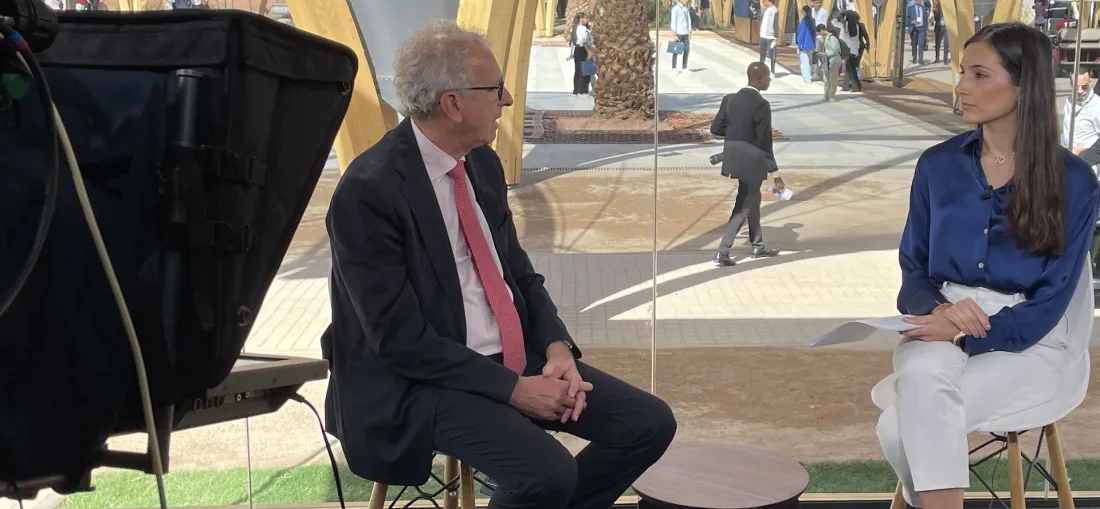Pierre Gramegna in interview with CNBC

Transcript of interview with ESM Managing Director Pierre Gramegna
CNBC, 12 October 2023
Interviewer: Silvia Amaro
CNBC: I'd like to start our conversation by asking you about what's happening with the ESM reform. This has been such a debate within the Eurozone and yet this has not yet been approved. Where are we at this stage? Is it likely that we'll see this reform approved at all?
Pierre Gramegna: We have good news and a little bit of a waiting period in front of us. The good news is that 19 countries out of 20 have ratified it, including Croatia, that joined [the ESM] just recently this year. We are waiting for Italy to do the ratification. We are working hard to convince them to do so. There's a procedure going on. Obviously, Italy is a sovereign country, but Italy has committed to do it, and we bitterly need it because in these uncertain times with high volatility, with geopolitical conflicts, it is very important that we can ensure that the new ESM with the new treaty can enter into force, especially because we have there a backstop. That means an additional safety net to the Single Resolution Fund of the banks. That will increase stability in financial markets. That's exactly what we need now.
You have been waiting for this approval from Italy for a long time. Is Italy harming itself by not approving this reform?
Let's say that it is really difficult to understand the rationale or the financial rationale for not ratifying. I think it is a political fight, a political discussion in Italy. We have been delivering all the necessary information to convince those who are not that it's in the best interest of Italy, but also in the best interest of the 20 countries, because the paid-in capital at the ESM is there. This reform literally doesn't cost anything because the money that has been committed in the ESM, which has the highest paid-in capital of any international financial institution, is available.
Do you feel that there is perhaps a misunderstanding in Italy of what the ESM does?
Well, let's face it. The ESM has been used in the past to help five countries that really had huge economic and financial problems, and they received the help of the ESM. Fortunately, the ESM was there, with a lot of conditions and programmes that needed to be implemented, which were seen as tough, but that produced good results. If you look at the beneficiary member states, the five countries that received support from the ESM, they have now a growth rate that is higher than the average of the euro area, for one. And second, a country like Greece now recently received investment grade by one rating agency and Cyprus is now investment grade by all rating agencies. So, it proves that the system works.
There's also another element that is important and that is to underline that we want to focus also more on the precautionary loans of the European Stability Mechanism in the same way as the IMF is doing. They have revised the toolkit at the IMF recently just to put more emphasis on the precautionary loans. Why is that? Because the precautionary loans, they come into action earlier, before a country has unsolvable problems. We have that tool here. We haven't used it in the past. In the new treaty, it could be even more useful.
But isn't the problem the connection with austerity?
True, there is a connection with austerity programmes, and that's why exactly the precautionary loans can be triggered also with conditions much far less harsh, which will probably not stifle the growth of the country.
I'd also like to get your thoughts on whether we still need this reform from the point of view that now the ECB also has the anti-fragmentation tool. Is your job becoming a little bit redundant to support the Eurozone, now that the ECB has that tool?
We are very glad that the ECB has that tool, the TPI [Transmission Protection Instrument], as it's called, and it has worked very well without even being used. I could do the parallel with the ESM. We have two functions, the function to help countries that need it when it's happening, like we did in the last decade, and we have an insurance function when it's not needed. Now take fire insurance. When you have a fire insurance, you do not use it only when your house burns. You also use it when your house is not burning. The mere existence of the ESM is key. The €300 billion that we are managing to refinance, the debt of the five countries that we supported is obviously another activity that we have. I cannot imagine the euro area today without the ESM; we would just have no safety net.
We're talking here at the IMF/World Bank annual meetings a lot about the complexity of the world economy at this stage, the things that we're facing more and more challenges. How do you look at it? Is this complexity making your job in the markets a lot harder?
What makes work in the markets harder is the volatility and uncertainty and let's face it, we live in a world, especially the last two years, that has become far more uncertain, especially because of geopolitical conflicts. I think that geopolitical conflicts and wars that we have witnessed in the last 20 months are becoming predominant worries for all analysts, all market players. Even at the annual meeting of the IMF, I think the number one worry now are geopolitical risks and there are lots of other issues like high inflation; high interest rates, are there to stay for longer as long as we have not achieved the reduction of inflation to 2%. That is the common goal. But I think that the centre stage is now the political uncertainties internationally, obviously, and the risk of contamination or contagion of all these conflicts around the globe is worrying.
Are you worried that will translate into higher yields for the Eurozone periphery?
Well, when there's uncertainty, the market always prices in higher rates. When you see the market expectations in the long run, they're already quite high in the United States, also Europe, the 10-year bonds are at a very high level, the highest since the economic and financial crisis. We have now these additional geopolitical risks, which add to many others. The pandemic was one, and then the climate risks, not to forget, which are definitely there to stay.
I want you to focus again on Italy, but this time around on the dynamics in the bond market, because the 10-year also rose in recent weeks, particularly because the markets didn't enjoy that announcement on the budget. Do you share the market concern about fiscal prudence in Italy?
Well, I think we need fiscal prudence everywhere.
... but Italy is one of the biggest economies in Europe.
Yes. What I want to say is that in the pandemic, [public] debt rose quite a lot in all countries. Obviously, it becomes even more of a worry in a country like Italy that has a debt-to-GDP ratio of 140%. It becomes more obvious, and the markets have reacted. I think it should encourage Italy to ratify the ESM treaty, and give assurances for the future, as all countries that accumulated debt in the pandemic need to have it reduced.
This is exactly the goal of the economic governance review that is underway, where the wish of the ESM is that the 27 countries come to an agreement before the end of the year because that will stabilise the markets. We as ESM support that reform because we want the new Stability and Growth Pact to be credible, transparent, and ensure equal treatment. Because these three main elements need to be there.
Last but not least, the old pact discouraged a little bit investment. We have suffered from under-investment in the euro area over a long period, and it's only with higher productive investment, especially in digital and green, that we can generate growth for the future.
Author

Contacts


